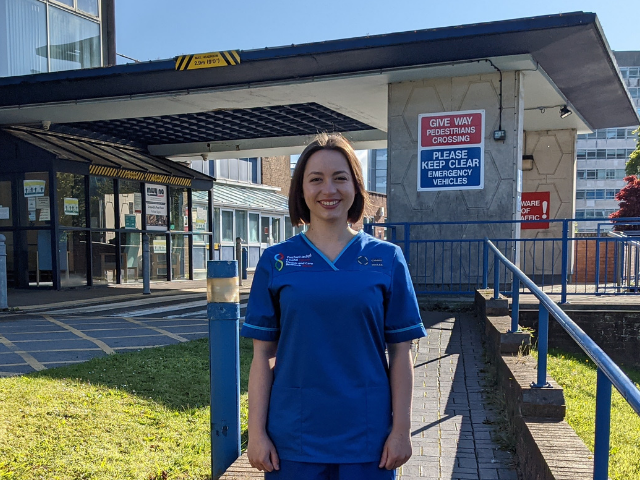
Nurse who didn’t enjoy science in school speaks about love of research
Swansea Research Nurse, Tabitha Rees, 30, has worked on some of the biggest COVID-19 research studies delivered in Wales. But even though her day now involves collecting and analysing data, she didn’t like science and maths at school.
For International Day of Women and Girls in Science, Tabitha encourages girls to think differently about what a career in science looks like.
“I hated science when I was at school. I didn’t enjoy it and I didn’t think it was relevant. I remember looking at onion cells under a microscope, doing long equations or experiments with Bunsen burners and thinking, when am I ever going to need to do this again? That was all I thought science was so I would never have guessed that one day I’d be working in research and loving it!
“My gateway into science was through psychology. I’ve had depression since I was 14 years old and so mental health has been a big focus for me. The support I had from NHS psychologists as a teenager helped me so much and made me want to help others like me, so I chose to study psychology at Cardiff University.
“I knew I’d have to do data collection and analysis for my dissertation and I was dreading it. To learn more, that summer I applied for an internship working with the Welsh School of Architecture on a project funded by the National Institute for Health Research (NIHR) which was looking into the health benefits of a new housing programme in Carmarthenshire. It changed my idea of what working in research could look like. I saw how science can be put into practice rather than it just being something I read about in textbooks. I started to understand how studies involve people and change lives.”
Tabitha became a research nurse at Singleton Hospital with Swansea Bay University Health Board in October 2019. This post is funded by Health and Care Research Wales.
Tabitha continued: “Being a research nurse is a perfect mix of working with people and data. It’s my role to be the patient’s advocate and to clearly explain studies so that they understand how taking part could help them and others in the future. I started just before the pandemic began and so I’ve worked on COVID-19 research including the RECOVERY trial and the GenOMICC study. I’m now working on the PHOSP-COVID study which is investigating long-term health outcomes for those who were hospitalised with COVID-19.
“I love being a research nurse and I hope other women will think about working in research. My opinion of science has completely changed since school. Through nursing, I now know that I can use science to help others and make significant improvements in care.
“My advice to others would be that if science was your least favourite subject in school, don’t let that prevent you from considering it as a career. One day I’d love to do some teaching and encourage a new generation of nurses into research.”
Find out more about the people behind the research and how Welsh research has changed lives
To get the latest research news in Wales straight to your inbox, sign up for our weekly bulletin